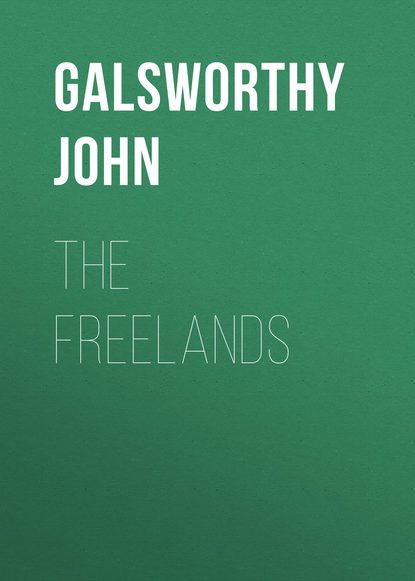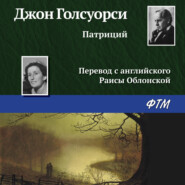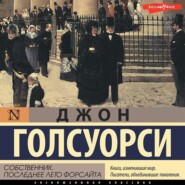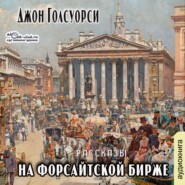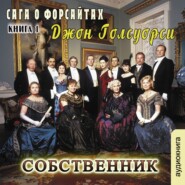По всем вопросам обращайтесь на: info@litportal.ru
(©) 2003-2024.
✖
The Freelands
Настройки чтения
Размер шрифта
Высота строк
Поля
John said abruptly:
“Felix, you’d better go down.”
Felix was sitting back, his eyes for once withdrawn from his brothers’ faces.
“Odd,” he said, “really odd, that with a perfectly unique person like Tod for a brother, we only see him once in a blue moon.”
“It’s because he IS so d – d unique.”
Felix got up and gravely extended his hand to Stanley.
“By Jove,” he said, “you’ve spoken truth.” And to John he added: “Well, I WILL go, and let you know the upshot.”
When he had departed, the two elder brothers remained for some moments silent, then Stanley said:
“Old Felix is a bit tryin’! With the fuss they make of him in the papers, his head’s swelled!”
John did not answer. One could not in so many words resent one’s own brother being made a fuss of, and if it had been for something real, such as discovering the source of the Black River, conquering Bechuanaland, curing Blue-mange, or being made a Bishop, he would have been the first and most loyal in his appreciation; but for the sort of thing Felix made up – Fiction, and critical, acid, destructive sort of stuff, pretending to show John Freeland things that he hadn’t seen before – as if Felix could! – not at all the jolly old romance which one could read well enough and enjoy till it sent you to sleep after a good day’s work. No! that Felix should be made a fuss of for such work as that really almost hurt him. It was not quite decent, violating deep down one’s sense of form, one’s sense of health, one’s traditions. Though he would not have admitted it, he secretly felt, too, that this fuss was dangerous to his own point of view, which was, of course, to him the only real one. And he merely said:
“Will you stay to dinner, Stan?”
CHAPTER III
If John had those sensations about Felix, so – when he was away from John – had Felix about himself. He had never quite grown out of the feeling that to make himself conspicuous in any way was bad form. In common with his three brothers he had been through the mills of gentility – those unique grinding machines of education only found in his native land. Tod, to be sure, had been publicly sacked at the end of his third term, for climbing on to the headmaster’s roof and filling up two of his chimneys with football pants, from which he had omitted to remove his name. Felix still remembered the august scene – the horrid thrill of it, the ominous sound of that: “Freeland minimus!” the ominous sight of poor little Tod emerging from his obscurity near the roof of the Speech Room, and descending all those steps. How very small and rosy he had looked, his bright hair standing on end, and his little blue eyes staring up very hard from under a troubled frown. And the august hand holding up those sooty pants, and the august voice: “These appear to be yours, Freeland minimus. Were you so good as to put them down my chimneys?” And the little piping, “Yes, sir.”
“May I ask why, Freeland minimus?”
“I don’t know, sir.”
“You must have had some reason, Freeland minimus?”
“It was the end of term, sir.”
“Ah! You must not come back here, Freeland minimus. You are too dangerous, to yourself, and others. Go to your place.”
And poor little Tod ascending again all those steps, cheeks more terribly rosy than ever, eyes bluer, from under a still more troubled frown; little mouth hard set; and breathing so that you could hear him six forms off. True, the new Head had been goaded by other outrages, the authors of which had not omitted to remove their names; but the want of humor, the amazing want of humor! As if it had not been a sign of first-rate stuff in Tod! And to this day Felix remembered with delight the little bubbling hiss that he himself had started, squelched at once, but rippling out again along the rows like tiny scattered lines of fire when a conflagration is suppressed. Expulsion had been the salvation of Tod! Or – his damnation? Which? God would know, but Felix was not certain. Having himself been fifteen years acquiring ‘Mill’ philosophy, and another fifteen years getting rid of it, he had now begun to think that after all there might be something in it. A philosophy that took everything, including itself, at face value, and questioned nothing, was sedative to nerves too highly strung by the continual examination of the insides of oneself and others, with a view to their alteration. Tod, of course, having been sent to Germany after his expulsion, as one naturally would be, and then put to farming, had never properly acquired ‘Mill’ manner, and never sloughed it off; and yet he was as sedative a man as you could meet.
Emerging from the Tube station at Hampstead, he moved toward home under a sky stranger than one might see in a whole year of evenings. Between the pine-trees on the ridge it was opaque and colored like pinkish stone, and all around violent purple with flames of the young green, and white spring blossom lit against it. Spring had been dull and unimaginative so far, but this evening it was all fire and gathered torrents; Felix wondered at the waiting passion of that sky.
He reached home just as those torrents began to fall.
The old house, beyond the Spaniard’s Road, save for mice and a faint underlying savor of wood-rot in two rooms, well satisfied the aesthetic sense. Felix often stood in his hall, study, bedroom, and other apartments, admiring the rich and simple glow of them – admiring the rarity and look of studied negligence about the stuffs, the flowers, the books, the furniture, the china; and then quite suddenly the feeling would sweep over him: “By George, do I really own all this, when my ideal is ‘bread and water, and on feast days a little bit of cheese’?” True, he was not to blame for the niceness of his things – Flora did it; but still – there they were, a little hard to swallow for an epicurean. It might, of course, have been worse, for if Flora had a passion for collecting, it was a very chaste one, and though what she collected cost no little money, it always looked as if it had been inherited, and – as everybody knows – what has been inherited must be put up with, whether it be a coronet or a cruet-stand.
To collect old things, and write poetry! It was a career; one would not have one’s wife otherwise. She might, for instance, have been like Stanley’s wife, Clara, whose career was wealth and station; or John’s wife, Anne, whose career had been cut short; or even Tod’s wife, Kirsteen, whose career was revolution. No – a wife who had two, and only two children, and treated them with affectionate surprise, who was never out of temper, never in a hurry, knew the points of a book or play, could cut your hair at a pinch; whose hand was dry, figure still good, verse tolerable, and – above all – who wished for no better fate than Fate had given her – was a wife not to be sneezed at. And Felix never had. He had depicted so many sneezing wives and husbands in his books, and knew the value of a happy marriage better perhaps than any one in England. He had laid marriage low a dozen times, wrecked it on all sorts of rocks, and had the greater veneration for his own, which had begun early, manifested every symptom of ending late, and in the meantime walked down the years holding hands fast, and by no means forgetting to touch lips.
Hanging up the gray top hat, he went in search of her. He found her in his dressing-room, surrounded by a number of little bottles, which she was examining vaguely, and putting one by one into an ‘inherited’ waste-paper basket. Having watched her for a little while with a certain pleasure, he said:
“Yes, my dear?”
Noticing his presence, and continuing to put bottles into the basket, she answered:
“I thought I must – they’re what dear Mother’s given us.”
There they lay – little bottles filled with white and brown fluids, white and blue and brown powders; green and brown and yellow ointments; black lozenges; buff plasters; blue and pink and purple pills. All beautifully labelled and corked.
And he said in a rather faltering voice:
“Bless her! How she does give her things away! Haven’t we used ANY?”
“Not one. And they have to be cleared away before they’re stale, for fear we might take one by mistake.”
“Poor Mother!”
“My dear, she’s found something newer than them all by now.”
Felix sighed.
“The nomadic spirit. I have it, too!”
And a sudden vision came to him of his mother’s carved ivory face, kept free of wrinkles by sheer will-power, its firm chin, slightly aquiline nose, and measured brows; its eyes that saw everything so quickly, so fastidiously, its compressed mouth that smiled sweetly, with a resolute but pathetic acceptation. Of the piece of fine lace, sometimes black, sometimes white, over her gray hair. Of her hands, so thin now, always moving a little, as if all the composure and care not to offend any eye by allowing Time to ravage her face, were avenging themselves in that constant movement. Of her figure, that was short but did not seem so, still quick-moving, still alert, and always dressed in black or gray. A vision of that exact, fastidious, wandering spirit called Frances Fleeming Freeland – that spirit strangely compounded of domination and humility, of acceptation and cynicism; precise and actual to the point of desert dryness; generous to a point that caused her family to despair; and always, beyond all things, brave.
Flora dropped the last little bottle, and sitting on the edge of the bath let her eyebrows rise. How pleasant was that impersonal humor which made her superior to other wives!
“You – nomadic? How?”
“Mother travels unceasingly from place to place, person to person, thing to thing. I travel unceasingly from motive to motive, mind to mind; my native air is also desert air – hence the sterility of my work.”
Flora rose, but her eyebrows descended.
“Your work,” she said, “is not sterile.”
“That, my dear,” said Felix, “is prejudice.” And perceiving that she was going to kiss him, he waited without annoyance. For a woman of forty-two, with two children and three books of poems – and not knowing which had taken least out of her – with hazel-gray eyes, wavy eyebrows darker than they should have been, a glint of red in her hair; wavy figure and lips; quaint, half-humorous indolence, quaint, half-humorous warmth – was she not as satisfactory a woman as a man could possibly have married!
“I have got to go down and see Tod,” he said. “I like that wife of his; but she has no sense of humor. How much better principles are in theory than in practice!”
Flora repeated softly, as if to herself:
“I’m glad I have none.” She was at the window leaning out, and Felix took his place beside her. The air was full of scent from wet leaves, alive with the song of birds thanking the sky. Suddenly he felt her arm round his ribs; either it or they – which, he could not at the moment tell – seemed extraordinarily soft…
Between Felix and his young daughter, Nedda, there existed the only kind of love, except a mother’s, which has much permanence – love based on mutual admiration. Though why Nedda, with her starry innocence, should admire him, Felix could never understand, not realizing that she read his books, and even analyzed them for herself in the diary which she kept religiously, writing it when she ought to have been asleep. He had therefore no knowledge of the way his written thoughts stimulated the ceaseless questioning that was always going on within her; the thirst to know why this was and that was not. Why, for instance, her heart ached so some days and felt light and eager other days? Why, when people wrote and talked of God, they seemed to know what He was, and she never did? Why people had to suffer; and the world be black to so many millions? Why one could not love more than one man at a time? Why – a thousand things? Felix’s books supplied no answers to these questions, but they were comforting; for her real need as yet was not for answers, but ever for more questions, as a young bird’s need is for opening its beak without quite knowing what is coming out or going in. When she and her father walked, or sat, or went to concerts together, their talk was neither particularly intimate nor particularly voluble; they made to each other no great confidences. Yet each was certain that the other was not bored – a great thing; and they squeezed each other’s little fingers a good deal – very warming. Now with his son Alan, Felix had a continual sensation of having to keep up to a mark and never succeeding – a feeling, as in his favorite nightmare, of trying to pass an examination for which he had neglected to prepare; of having to preserve, in fact, form proper to the father of Alan Freeland. With Nedda he had a sense of refreshment; the delight one has on a spring day, watching a clear stream, a bank of flowers, birds flying. And Nedda with her father – what feeling had she? To be with him was like a long stroking with a touch of tickle in it; to read his books, a long tickle with a nice touch of stroking now and then when one was not expecting it.
That night after dinner, when Alan had gone out and Flora into a dream, she snuggled up alongside her father, got hold of his little finger, and whispered:
“Come into the garden, Dad; I’ll put on goloshes. It’s an awfully nice moon.”
The moon indeed was palest gold behind the pines, so that its radiance was a mere shower of pollen, just a brushing of white moth-down over the reeds of their little dark pond, and the black blur of the flowering currant bushes. And the young lime-trees, not yet in full leaf, quivered ecstatically in that moon-witchery, still letting fall raindrops of the past spring torrent, with soft hissing sounds. A real sense in the garden, of God holding his breath in the presence of his own youth swelling, growing, trembling toward perfection! Somewhere a bird – a thrush, they thought – mixed in its little mind as to night and day, was queerly chirruping. And Felix and his daughter went along the dark wet paths, holding each other’s arms, not talking much. For, in him, very responsive to the moods of Nature, there was a flattered feeling, with that young arm in his, of Spring having chosen to confide in him this whispering, rustling hour. And in Nedda was so much of that night’s unutterable youth – no wonder she was silent! Then, somehow – neither responsible – they stood motionless. How quiet it was, but for a distant dog or two, and the stilly shivering-down of the water drops, and the far vibration of the million-voiced city! How quiet and soft and fresh! Then Nedda spoke:
“Dad, I do so want to know everything.”





